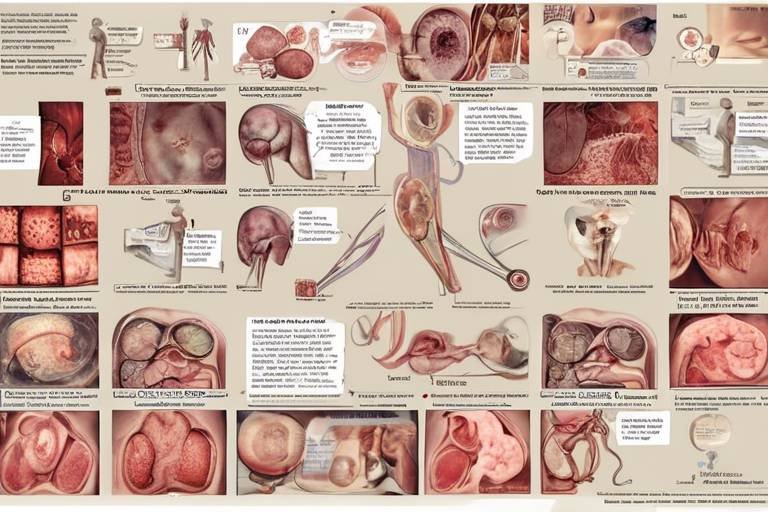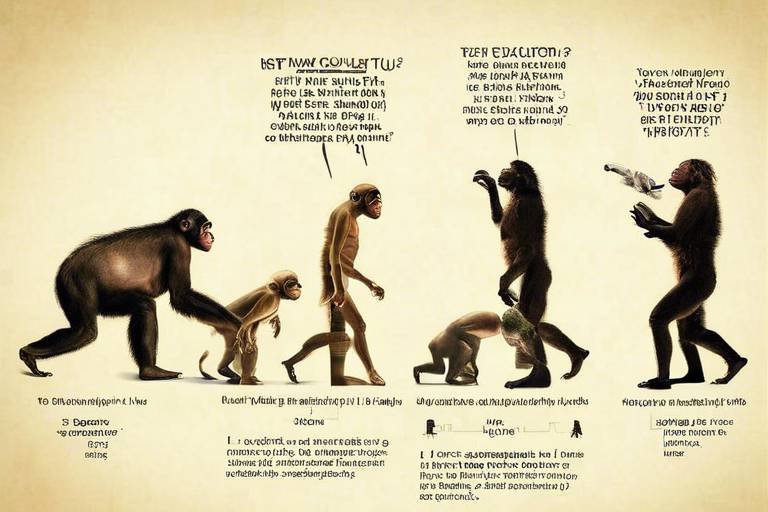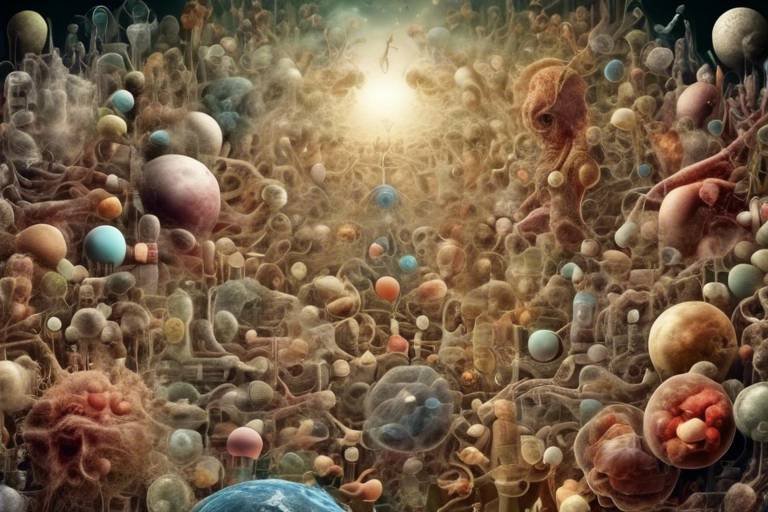Bioethics - The Moral Issues in Biological Sciences
In an age where science is advancing at breakneck speed, the field of bioethics has emerged as a crucial area of study that grapples with the ethical dilemmas posed by these advancements. From the intricacies of genetic engineering to the complexities of stem cell research, bioethics seeks to navigate the murky waters where science meets morality. Imagine standing at a crossroads, where every decision could impact not just individuals, but entire communities and ecosystems. This is the reality we face as we explore the implications of breakthroughs in genetics, medicine, and biotechnology.
At its core, bioethics is a multidisciplinary field that examines the ethical, legal, and social implications of biological research and applications. It ensures that the march of scientific progress aligns with our moral values and societal norms. Think of it as a moral compass guiding researchers, policymakers, and society at large through the intricate landscape of modern biology. As we delve deeper into this subject, we will uncover the profound questions that challenge our understanding of life, health, and the environment.
As we explore the ethical dilemmas that arise in biological sciences, we must consider not only the potential benefits of these advancements but also the risks and responsibilities that come with them. The rapid development of technologies such as genetic engineering and biotechnology raises critical questions about human intervention in natural processes. Are we playing God, and if so, what are the consequences? The answers may not be straightforward, but they are essential in shaping a future where science and ethics coexist harmoniously.
Moreover, the implications of these advancements extend beyond individual lives; they ripple through society and the environment. As we navigate this complex terrain, it becomes clear that the conversation around bioethics is not just for scientists and ethicists but for everyone. It invites us all to reflect on our values, our responsibilities, and the kind of world we want to create. So, fasten your seatbelts as we embark on this journey through the ethical landscape of biological sciences, where every twist and turn reveals new insights and challenges.
- What is bioethics? Bioethics is the study of the ethical implications of biological research and applications, focusing on the intersection of science, morality, and societal norms.
- Why is bioethics important? It ensures that scientific advancements align with ethical standards, protecting individuals and communities from potential harm.
- How does genetic engineering relate to bioethics? Genetic engineering raises questions about the morality of altering life forms, including concerns about designer babies and genetic diversity.
- What are some ethical concerns in stem cell research? Ethical dilemmas in stem cell research often revolve around the sourcing of stem cells, particularly those derived from embryos.
- How does biotechnology impact public health? Biotechnology plays a significant role in public health through vaccine development and disease prevention, raising ethical issues regarding access and equity.

Understanding Bioethics
This article explores the ethical dilemmas arising in biological sciences, discussing the implications of advancements in genetics, medicine, and biotechnology on society, individuals, and the environment.
Bioethics is a multidisciplinary field that examines the ethical, legal, and social implications of biological research and applications. It serves as a bridge between the rapid advancements in biological sciences and the moral values that govern our society. As we venture deeper into the realms of genetics, medicine, and biotechnology, the questions we face are profound and often complex. How do we balance the promise of scientific innovation with the ethical considerations that come with it? This is where bioethics plays a crucial role.
The essence of bioethics lies in its ability to ensure that scientific progress aligns with moral values and societal norms. It prompts us to think critically about the consequences of our actions and the responsibilities we hold towards each other and the environment. For instance, when researchers develop new technologies that can alter human DNA, they must consider not only the potential benefits but also the ethical ramifications of creating so-called "designer babies." This raises important questions about what it means to be human and the natural order of life.
Bioethics encourages an inclusive dialogue among scientists, ethicists, policymakers, and the public. It fosters a collaborative environment where diverse perspectives can contribute to understanding the implications of biological advancements. The field is not just about setting rules; it's about engaging in conversations that help shape our collective future. For example, when discussing stem cell research, bioethics helps navigate the murky waters of consent, the sourcing of stem cells, and the potential for medical breakthroughs versus the moral implications of their acquisition.
Moreover, bioethics is not static; it evolves as new technologies and discoveries emerge. This adaptability is crucial in a world where the pace of scientific advancement often outstrips our ability to legislate or regulate effectively. As we explore the implications of biotechnology on public health, environmental sustainability, and individual rights, bioethics provides a framework that can guide our decisions and actions.
In summary, understanding bioethics is essential for navigating the complex landscape of biological sciences. It empowers us to ask tough questions, engage in meaningful discussions, and ultimately make informed decisions that reflect our values and ethics. As we continue to push the boundaries of what is possible, let us remember that the heart of bioethics lies in our commitment to humanity and the planet.
- What is bioethics? - Bioethics is the study of the ethical, legal, and social implications of biological research and applications.
- Why is bioethics important? - It helps ensure that scientific advancements align with moral values and societal norms, guiding responsible decision-making in the field of biology.
- How does bioethics evolve? - Bioethics adapts to new technologies and discoveries, allowing for ongoing discussions and updates to ethical frameworks as society changes.

Genetic Engineering and Ethics
As we stand on the brink of a new era in science, genetic engineering has emerged as a double-edged sword, slicing through the fabric of what we once thought was unchangeable. Imagine having the power to edit the very code of life, to snip out diseases like a bad stitch in a beautiful garment. But with great power comes great responsibility, and the ethical questions surrounding this technology are as complex as the DNA strands it seeks to modify.
At the heart of the ethical debate lies the concept of human intervention in natural processes. Should we play god? This question is not just a philosophical musing; it has real-world implications. The potential for creating designer babies—children whose traits are selected by their parents—sparks heated discussions. While the idea of eliminating genetic disorders is alluring, it raises concerns about equity and the unforeseen impacts on genetic diversity. What happens if only the wealthy can afford such modifications? Will we create a society divided not just by class, but by genetic privilege?
One of the most groundbreaking tools in genetic engineering is CRISPR technology. This revolutionary method allows scientists to edit genes with unprecedented precision, akin to using a word processor to correct typos in a manuscript. However, this power is not without its pitfalls. The potential for misuse raises eyebrows—imagine a world where genetic modifications are used for unethical purposes, such as creating biological weapons or enhancing human capabilities in a way that could lead to new forms of inequality.
While the promise of gene editing to eradicate genetic disorders is tantalizing, it also brings forth a myriad of ethical dilemmas. Who gets to decide which genes are 'desirable'? The concept of informed consent becomes murky when discussing unborn children. Can we justify the alteration of a child's genetic makeup without their consent? Furthermore, the long-term effects on future generations remain largely unknown. It’s like planting a tree without knowing how it will grow—what if it bears poisonous fruit?
Given these profound ethical concerns, the regulation of genetic modifications becomes crucial. We must establish guidelines that ensure responsible use of this technology. This involves a delicate balance: fostering innovation while safeguarding ethical standards to protect individuals and society as a whole. A robust regulatory framework could serve as a safety net, catching potential abuses before they spiral out of control. Imagine if every country had a set of ethical standards for genetic engineering—what a world that could be!
Another area intertwined with genetic engineering is stem cell research. While it holds the promise of medical breakthroughs, particularly in regenerative medicine, it raises ethical questions about the sourcing of stem cells. The debate often centers around embryonic stem cells, which are derived from human embryos. This has led to heated discussions about the moral status of embryos and the need for clear guidelines to navigate this complex landscape.
In conclusion, the field of genetic engineering is a fascinating yet fraught landscape. As we continue to unlock the secrets of our genetic code, we must tread carefully, ensuring that our advancements align with our moral compass. The ethical dilemmas we face today will shape the future of humanity, and it’s up to us to steer the ship in the right direction.
- What is genetic engineering? Genetic engineering is the manipulation of an organism's genes using biotechnology to alter its characteristics.
- What are the ethical concerns associated with genetic engineering? Ethical concerns include the potential for creating inequality, the moral implications of altering human life, and the long-term effects on future generations.
- How does CRISPR technology work? CRISPR technology allows scientists to edit genes by cutting DNA at specific locations, enabling the removal or alteration of genetic material.
- Why is regulation important in genetic engineering? Regulation is crucial to ensure the responsible use of genetic engineering technologies, preventing misuse and protecting public health and safety.

CRISPR Technology
CRISPR technology has emerged as a groundbreaking tool in the realm of genetic engineering, allowing scientists to edit genes with unprecedented precision and efficiency. This revolutionary method, which stands for Clustered Regularly Interspaced Short Palindromic Repeats, utilizes a natural defense mechanism found in bacteria. It enables researchers to target specific DNA sequences, making alterations that can potentially correct genetic disorders or enhance desired traits. However, while the possibilities are exciting, they also come with a plethora of ethical concerns that cannot be overlooked.
Imagine a world where we could eliminate hereditary diseases before a child is even born. The idea is tantalizing, but it raises a host of questions. For instance, if we can create designer babies with specific traits, such as intelligence or physical appearance, what does that mean for the concept of natural genetic diversity? Are we playing God, or are we simply utilizing our scientific advancements for the greater good? The implications of such power are vast and complex.
Moreover, the precision of CRISPR technology is not without its pitfalls. The potential for off-target effects—unintended changes to other parts of the genome—poses a significant risk. This could lead to unforeseen consequences that might not manifest until generations later. As such, the ethical landscape surrounding CRISPR is fraught with dilemmas that necessitate rigorous debate and careful regulation.
To address these ethical concerns, several key principles should guide the use of CRISPR technology:
- Informed Consent: Individuals involved in genetic research or treatments must fully understand the implications of the procedures.
- Equity: Access to genetic editing technologies should be fair and equitable, avoiding a divide between the wealthy and the less fortunate.
- Long-term Impact: Researchers must consider the potential long-term effects on both individuals and the broader ecosystem.
As we forge ahead into this new frontier, it is crucial to establish a regulatory framework that balances innovation with ethical considerations. Policymakers, scientists, and ethicists must collaborate to create guidelines that ensure responsible use of CRISPR technology. This will not only protect individuals but also safeguard the integrity of our genetic heritage.
1. What is CRISPR technology?
CRISPR technology is a revolutionary gene-editing tool that allows scientists to modify DNA with high precision, enabling the correction of genetic defects and the enhancement of desired traits.
2. What are the ethical concerns associated with CRISPR?
The ethical concerns include the potential for designer babies, off-target effects, informed consent, and issues of equity in access to genetic modifications.
3. How does CRISPR work?
CRISPR works by utilizing a guide RNA to identify a specific DNA sequence, allowing the Cas9 enzyme to cut the DNA at that location, enabling the addition or removal of genetic material.
4. What is the future of CRISPR technology?
The future of CRISPR technology holds immense potential for medical advancements, but it also requires careful regulation and ethical considerations to ensure its responsible use.

Ethical Concerns of Gene Editing
Gene editing, particularly through technologies like CRISPR, holds incredible promise for eliminating genetic disorders and enhancing human health. However, this power comes with a hefty moral baggage that society must grapple with. One of the major ethical concerns is the issue of consent. When it comes to editing the genes of embryos, who gives consent? The future individual whose genes are being altered cannot voice their approval or disapproval. This raises profound questions about autonomy and the rights of those who are yet to be born.
Moreover, there's the question of equity. If gene editing becomes a reality, will it be accessible to everyone, or only to those who can afford it? Imagine a world where only the wealthy can afford genetic enhancements, creating a new class of "genetically superior" individuals. This scenario could exacerbate existing social inequalities, leading to a society divided not just by wealth, but by genetics. Such disparities pose serious ethical dilemmas that we need to consider before diving headfirst into gene editing technologies.
Another significant concern involves the unforeseen impacts on future generations. Gene editing might solve immediate health issues, but what are the long-term consequences? Altering one gene could have cascading effects on other genes, potentially introducing new health problems that we cannot predict. The idea of "playing God" is not just a cliché; it embodies the fear that we might disrupt the delicate balance of nature, leading to unintended consequences that could affect entire populations.
To navigate these ethical waters, it is essential to establish robust regulatory frameworks. These frameworks should not only focus on the scientific aspects but also incorporate ethical considerations that reflect societal values. Think of it as a safety net that ensures we don’t leap into the unknown without a plan. Responsible governance can help balance the excitement of innovation with the need to protect individuals and society from potential harm.
In summary, while gene editing offers groundbreaking potential, it is crucial to approach this technology with caution. The ethical concerns surrounding consent, equity, unforeseen impacts, and the necessity for regulation must be at the forefront of any discussions about the future of genetic modification. We stand at a crossroads where the decisions we make today will shape the genetic landscape of tomorrow.
- What is gene editing? Gene editing is a technique that allows scientists to alter an organism's DNA, potentially correcting genetic disorders or enhancing certain traits.
- What are the risks associated with gene editing? Risks include unintended genetic changes, ethical concerns regarding consent and equity, and potential long-term health impacts on future generations.
- How can we ensure ethical practices in gene editing? Establishing regulatory frameworks that include ethical considerations and public discourse can help guide responsible use of gene editing technologies.

Regulation of Genetic Modifications
The regulation of genetic modifications is a crucial aspect of bioethics that demands our attention. As we venture into the uncharted waters of genetic engineering, we must ask ourselves: how do we balance the incredible potential of these technologies with the ethical implications they carry? The rapid advancement in genetic modification techniques, particularly with tools like CRISPR, has outpaced the development of comprehensive regulatory frameworks. This creates a scenario where innovation might run amok without proper oversight.
To navigate this complex landscape, regulatory bodies across the globe are beginning to establish guidelines. These regulations aim to ensure that genetic modifications are conducted responsibly and ethically. Some of the key areas that require stringent regulations include:
- Safety Assessments: Before any genetic modification can be approved, thorough safety assessments must be conducted to evaluate potential risks to human health and the environment.
- Transparency: Researchers and companies involved in genetic modifications should be required to disclose their methods and findings to the public to foster trust and accountability.
- Public Engagement: Engaging the public in discussions about genetic modifications is essential. This ensures that societal values and concerns are taken into account during the regulatory process.
Moreover, regulations should not only focus on the immediate effects of genetic modifications but also consider long-term implications. For instance, what happens to the genetic makeup of future generations? Will we inadvertently create a divide between those who can afford genetic enhancements and those who cannot? These are questions that regulatory bodies must address to ensure equitable access to genetic technologies.
In addition, international collaboration is vital. Genetic modifications do not respect borders; therefore, a cohesive global framework is necessary to prevent unethical practices and ensure that all countries adhere to similar standards. The establishment of an international regulatory body could help facilitate this cooperation, providing guidelines that nations can adapt to their specific contexts.
In conclusion, the regulation of genetic modifications must be a dynamic process, continually evolving as new technologies emerge and societal values shift. By prioritizing ethics in regulation, we can harness the power of genetic engineering while safeguarding the well-being of individuals and society as a whole.
- What are genetic modifications? Genetic modifications refer to the direct manipulation of an organism's DNA to alter its characteristics.
- Why is regulation important? Regulation is important to ensure the safety, efficacy, and ethical use of genetic modifications in society.
- How can the public engage in discussions about genetic modifications? The public can engage through forums, community discussions, and by providing feedback to regulatory bodies during public comment periods.

Stem Cell Research
Stem cell research is a fascinating and rapidly evolving field that holds the promise of groundbreaking medical advancements. These remarkable cells have the unique ability to develop into various types of cells in the body, making them a powerful tool for regenerative medicine. However, the journey of stem cell research is not without its ethical hurdles and societal implications. One of the most contentious issues revolves around the sourcing of stem cells, particularly those derived from human embryos. This raises profound questions about the moral status of embryos and the extent to which they can be used for scientific purposes.
On one hand, proponents argue that the potential benefits of stem cell research are immense. For instance, stem cells could potentially lead to treatments for debilitating diseases such as Parkinson's, diabetes, and spinal cord injuries. Imagine a world where conditions that currently require lifelong management could be treated with a single therapy derived from stem cells. The possibilities are truly exciting! However, the ethical concerns surrounding the use of embryonic stem cells cannot be overlooked. Many individuals and groups believe that life begins at conception, making the destruction of embryos for research purposes morally unacceptable.
To navigate these complex ethical waters, it is essential to establish clear guidelines and regulations governing stem cell research. These regulations should aim to balance the pursuit of scientific knowledge with respect for human dignity. For example, some countries have adopted strict laws that limit or prohibit the use of embryonic stem cells, while others allow it under specific conditions. This divergence in regulations can create a patchwork of ethical standards globally, complicating international collaboration in research.
Additionally, the advancement of induced pluripotent stem cells (iPSCs) has provided an alternative to embryonic stem cells. iPSCs are adult cells that have been genetically reprogrammed to an embryonic stem cell-like state, allowing them to differentiate into any cell type. This breakthrough not only alleviates some ethical concerns but also opens new avenues for personalized medicine. However, even with iPSCs, ethical considerations remain, particularly regarding the consent of donors and the potential for unforeseen consequences in their use.
In summary, while stem cell research is at the forefront of medical innovation, it is crucial to approach it with a sense of responsibility and ethical consideration. The potential benefits are staggering, but they must be weighed against the moral implications of the methods used. As we continue to explore this exciting field, ongoing dialogue among scientists, ethicists, and the public will be vital to ensure that we harness the power of stem cells in a way that respects human life and promotes the greater good.
- What are stem cells?
Stem cells are unique cells capable of developing into different cell types in the body, making them essential for growth, repair, and regeneration. - Why is stem cell research important?
This research has the potential to lead to breakthroughs in treating various diseases, including cancer, diabetes, and neurological disorders. - What are the ethical concerns surrounding stem cell research?
Ethical concerns primarily focus on the sourcing of embryonic stem cells, with debates about the moral status of embryos and the implications of their use in research. - What are induced pluripotent stem cells (iPSCs)?
iPSCs are adult cells that have been genetically reprogrammed to act like embryonic stem cells, providing an ethical alternative for research. - How is stem cell research regulated?
Regulations vary by country, with some allowing embryonic stem cell research under strict guidelines, while others impose bans or limitations.

Biotechnology and Public Health
Biotechnology is not just a buzzword; it plays a critical role in shaping public health outcomes across the globe. From the development of life-saving vaccines to innovative therapies that tackle chronic diseases, the implications of biotechnological advancements are profound and far-reaching. Imagine a world where diseases that once plagued humanity are eradicated through cutting-edge science—this is the promise that biotechnology holds. However, with great power comes great responsibility, and the ethical considerations surrounding these advancements cannot be overlooked.
One of the most notable contributions of biotechnology to public health is in the realm of vaccine development. Vaccines have been instrumental in controlling infectious diseases, saving millions of lives annually. The process of developing vaccines has become increasingly sophisticated, utilizing recombinant DNA technology and other biotechnological methods to create more effective immunizations. Yet, as we celebrate these achievements, we must also confront the ethical dilemmas that arise:
- Informed Consent: Are individuals fully aware of what they are receiving when they get vaccinated? Ensuring that people understand the benefits and potential risks is essential.
- Equitable Access: How can we guarantee that vaccines are available to all, regardless of socioeconomic status? Disparities in access can lead to outbreaks and health crises.
- Community Responsibility: What is the balance between individual rights and community health? The concept of herd immunity underscores the importance of widespread vaccination.
Furthermore, biotechnology enhances our ability to prevent diseases through early detection and personalized medicine. With advancements in genetic testing, we can identify individuals at risk for certain conditions and implement preventive measures tailored to their unique genetic makeup. This not only promotes better health outcomes but also raises questions about privacy and the ethical use of genetic information. Are we prepared to handle the implications of knowing our genetic vulnerabilities?
As we navigate the landscape of biotechnology and public health, it is crucial to establish policies and guidelines that promote fairness and inclusivity. The disparities in access to biotechnological innovations can exacerbate existing health inequalities. For instance, consider the distribution of COVID-19 vaccines: countries with fewer resources faced significant challenges in accessing vaccines, leading to a global health crisis. Addressing these disparities necessitates a collaborative effort among governments, healthcare organizations, and biotechnology companies to ensure that advancements benefit everyone.
In summary, biotechnology is a powerful tool in the arsenal against public health challenges. However, we must tread carefully, ensuring that ethical considerations guide our actions and policies. The balance between innovation and responsibility is delicate, but with thoughtful dialogue and inclusive practices, we can harness the potential of biotechnology to create a healthier future for all.
- What is biotechnology? Biotechnology is the use of biological systems or living organisms to develop products, improve plants or animals, or develop microorganisms for specific uses.
- How does biotechnology impact public health? Biotechnology contributes to public health through the development of vaccines, diagnostic tools, and personalized medicine, helping to prevent and treat diseases more effectively.
- What are some ethical concerns associated with biotechnology? Ethical concerns include issues of informed consent, equitable access to biotechnological innovations, and the implications of genetic testing and data privacy.

Vaccination Ethics
Vaccination ethics is a complex and multifaceted topic that sits at the crossroads of individual rights and community responsibility. At its core, the ethical debate surrounding vaccinations revolves around the balance between protecting public health and respecting personal autonomy. In a world where diseases can spread like wildfire, the question arises: should individuals have the right to refuse vaccination for themselves or their children, even if their decision could potentially endanger others? This dilemma is reminiscent of a double-edged sword, where one side represents personal freedom and the other, the collective good.
One of the fundamental ethical principles in vaccination is the concept of informed consent. This means that individuals should have access to comprehensive information about vaccines, including their benefits, risks, and potential side effects. However, the challenge lies in ensuring that this information is communicated effectively. Misinformation can spread just as quickly as a virus, making it imperative for healthcare providers to engage in transparent communication with patients. It’s essential to ask: are we doing enough to educate the public about the science behind vaccinations?
Another critical aspect of vaccination ethics is equitable access. Not everyone has the same opportunities to receive vaccinations, creating disparities that can exacerbate health inequalities. For instance, marginalized communities often face barriers such as socioeconomic status, geographic location, and systemic inequalities that hinder their access to vaccines. This raises an ethical concern: how can we ensure that all individuals, regardless of their background, have equal access to life-saving vaccinations? Addressing this issue requires a concerted effort from governments, healthcare systems, and communities to promote fairness and inclusivity in vaccine distribution.
Moreover, the ethical implications of vaccination extend beyond individual choices to encompass community health. Vaccines work on the principle of herd immunity, where a significant portion of the population is vaccinated to protect those who cannot be vaccinated, such as infants or individuals with certain medical conditions. This communal aspect of vaccination poses a moral obligation for those who can be vaccinated to do so, not just for their own protection but for the greater good of society. It’s a bit like a team sport—the success of the team relies on every player doing their part.
In summary, the ethics of vaccination are rooted in a delicate balance of personal rights, informed consent, and the collective responsibility we share as members of society. As we navigate the complexities of this issue, it's essential to foster an environment of understanding and dialogue, ensuring that ethical considerations guide our approach to vaccinations.
- What is informed consent in vaccination? Informed consent refers to the process of providing individuals with comprehensive information about vaccines, enabling them to make educated decisions regarding their health.
- Why is equitable access to vaccines important? Equitable access is crucial to ensure that all individuals, regardless of socioeconomic status or background, can receive vaccinations, thereby reducing health disparities.
- What is herd immunity? Herd immunity occurs when a significant portion of a population is vaccinated, providing indirect protection to those who cannot be vaccinated, thus safeguarding public health.

Access to Biotechnological Innovations
In today's world, biotechnological innovations are transforming healthcare, agriculture, and environmental management, offering solutions that were once deemed impossible. However, the question arises: who gets access to these groundbreaking technologies? The disparity in access can lead to significant ethical dilemmas, especially when considering that these innovations often come with hefty price tags and complex distribution networks.
Imagine a world where a revolutionary gene therapy could cure a genetic disorder, but only a select few can afford it. This scenario is not just hypothetical; it reflects the reality faced by many individuals around the globe. The gap between the wealthy and the underprivileged can widen if equitable access to these innovations is not prioritized. As we dive deeper into this issue, it's essential to recognize that access to biotechnological advancements is not merely a matter of economic capability but also involves social justice and ethical responsibility.
Several factors contribute to the uneven distribution of biotechnological innovations:
- Economic Barriers: High costs associated with research, development, and production can limit access for lower-income populations.
- Geographic Disparities: Rural and underserved areas often lack the infrastructure to support the delivery of advanced biotechnological solutions.
- Regulatory Challenges: Complex regulations can hinder the swift introduction of new technologies in certain regions, affecting availability.
To address these challenges, policymakers and stakeholders must collaborate to create frameworks that promote fairness and inclusivity. This could involve:
- Implementing subsidies or financial assistance programs for low-income individuals.
- Enhancing infrastructure in underserved areas to facilitate access.
- Streamlining regulatory processes to expedite the introduction of new biotechnological solutions.
Moreover, public awareness and education play a crucial role in ensuring that individuals understand their rights to access these innovations. Advocacy for equitable access can lead to more informed communities that demand accountability from both governments and corporations. In essence, the fight for access to biotechnological innovations is not just about technology; it’s about creating a just society where everyone has the opportunity to benefit from scientific advancements.
In conclusion, as we stand on the precipice of a biotechnological revolution, it is imperative that we consider the ethical implications of access. Ensuring that everyone, regardless of their socioeconomic status, can benefit from these innovations is not only a moral obligation but also a pathway to a healthier, more equitable future.
- What are biotechnological innovations?
Biotechnological innovations refer to the use of biological processes, organisms, or systems to develop products and technologies that improve human life, agriculture, and the environment. - Why is access to these innovations important?
Access to biotechnological innovations is crucial for ensuring that all individuals, regardless of their background, can benefit from advancements in healthcare, agriculture, and environmental sustainability. - What are some barriers to access?
Barriers include economic challenges, geographic disparities, and regulatory hurdles that can limit the availability of biotechnological solutions. - How can we promote equitable access?
Promoting equitable access can be achieved through policies that provide financial assistance, enhance infrastructure, and streamline regulatory processes.

Environmental Ethics in Biotechnology
As we delve into the realm of biotechnology, it is crucial to consider the environmental ethics that accompany these advancements. Biotechnology, while offering innovative solutions to various challenges, also poses significant questions regarding its impact on our ecosystems. The balance between progress and preservation is delicate, and understanding this balance is key to ensuring that we do not sacrifice our planet's health for the sake of scientific advancement.
One of the primary concerns in this area is the use of genetically modified organisms (GMOs). While GMOs can lead to increased agricultural productivity and resilience against pests, their introduction into ecosystems can have unforeseen consequences. For instance, there are worries about the potential for GMOs to disrupt local biodiversity. When a genetically modified crop is introduced, it can outcompete native species, leading to a decline in genetic diversity. This is not just a theoretical concern; real-world examples have shown that the introduction of certain GMOs can lead to significant ecological shifts.
Moreover, the ethical implications of bioremediation cannot be overlooked. This process, which involves using microorganisms to clean up environmental pollutants, has tremendous potential for restoring contaminated sites. However, it raises ethical questions regarding the safety and effectiveness of these microorganisms. For example, what happens if the introduced organisms do not behave as expected? Could they create new problems by interacting with existing species in unpredictable ways? These are questions that scientists and ethicists must grapple with as they develop bioremediation strategies.
To better understand the implications of biotechnology on the environment, consider the following key points:
- Impact on Biodiversity: The introduction of GMOs can lead to a reduction in native species, which can destabilize ecosystems.
- Long-term Ecological Effects: The long-term consequences of biotechnological interventions are often unknown and can lead to irreversible changes in habitats.
- Community Involvement: Local communities should be involved in decisions regarding biotechnological projects, ensuring that their voices are heard and their ecosystems are respected.
In summary, as we navigate the complex landscape of biotechnology, it is imperative to prioritize sustainable practices that protect our natural resources and biodiversity. Ethical considerations must guide our innovations, ensuring that we approach environmental challenges with a mindset that values both scientific progress and ecological integrity. By doing so, we can harness the benefits of biotechnology while safeguarding the planet for future generations.
What are the ethical concerns regarding GMOs?
The primary ethical concerns include their potential impact on biodiversity, food security, and the long-term ecological consequences of introducing genetically modified organisms into the environment.
How does bioremediation work?
Bioremediation involves using microorganisms to break down pollutants in the environment, effectively cleaning contaminated sites. However, it raises questions about the safety and effectiveness of the introduced organisms.
Why is community involvement important in biotechnological projects?
Community involvement ensures that the needs and concerns of local populations are addressed, promoting fairness and respect for local ecosystems during biotechnological interventions.

GMOs and Ecosystem Impact
The introduction of genetically modified organisms (GMOs) into our agricultural systems has sparked a heated debate, not just among scientists but also among the general public. While GMOs promise to enhance agricultural efficiency and increase food production, the implications for our ecosystems are profound and complex. Imagine a world where crops can resist pests and diseases without the need for chemical pesticides—sounds great, right? But what happens when these engineered crops interact with the natural environment?
One of the primary concerns regarding GMOs is their potential impact on biodiversity. When a single genetically modified crop dominates the market, it can lead to a decrease in the variety of plants cultivated. This monoculture can make ecosystems more vulnerable to pests and diseases, as the lack of diversity means there are fewer natural defenses. In essence, we might be trading short-term agricultural gains for long-term ecological risks. The balance of nature is delicate, and introducing GMOs could tip the scales in unpredictable ways.
Moreover, the cross-pollination of GMOs with wild relatives raises significant ecological concerns. For instance, if a GMO crop were to crossbreed with a wild plant, it could potentially introduce new traits into the wild population. This could lead to the emergence of superweeds that are resistant to herbicides, complicating weed management and threatening native plant species. The unintended consequences of such genetic exchanges can ripple through the ecosystem, affecting everything from soil health to wildlife that depends on native plants for food.
To understand the broader impact of GMOs, we need to consider both the benefits and the risks. Here’s a quick overview:
| Benefits of GMOs | Risks of GMOs |
|---|---|
| Increased crop yields | Loss of biodiversity |
| Reduced need for pesticides | Creation of superweeds |
| Enhanced nutritional content | Potential health risks |
| Resilience to climate change | Unforeseen ecological effects |
Another critical aspect to consider is the ethical dimension of using GMOs. Are we playing God by altering the genetic makeup of living organisms? This question often arises in discussions about the sustainability and morality of GMOs. It’s essential to weigh the benefits of increased food production against the potential risks to our environment and health. As we continue to innovate in biotechnology, we must do so with a sense of responsibility and caution.
In conclusion, while GMOs offer exciting possibilities for addressing food security, their impact on ecosystems cannot be overlooked. The balance between agricultural efficiency and ecological integrity is a tightrope walk that requires careful regulation and ongoing research. As we navigate this complex terrain, the importance of informed public discourse and transparent scientific practices becomes ever more critical.
- What are GMOs? Genetically modified organisms are organisms whose genetic material has been altered using genetic engineering techniques.
- Are GMOs safe for the environment? While GMOs can improve agricultural efficiency, their impact on biodiversity and ecosystems needs careful monitoring.
- How do GMOs affect biodiversity? GMOs can lead to monocultures, which reduce plant diversity and make ecosystems more vulnerable to pests and diseases.
- What are superweeds? Superweeds are wild plants that have developed resistance to herbicides, often as a result of cross-pollination with GMO crops.

Bioremediation Ethics
Bioremediation, the innovative process of using microorganisms to degrade environmental pollutants, is a shining example of how biotechnology can serve as a solution to some of our planet's most pressing issues. However, with great power comes great responsibility, and the ethical implications of this technique are vast and complex. As we harness nature's tiny warriors to combat pollution, we must ask ourselves: are we truly considering the long-term consequences of our actions?
One of the primary ethical concerns surrounding bioremediation is the safety of the microorganisms we introduce into the environment. While these organisms are often selected for their ability to break down harmful substances, the potential for unintended consequences cannot be overlooked. What happens if these microorganisms interact with native species? Could they disrupt local ecosystems or even lead to the extinction of certain organisms? These are questions that researchers and environmentalists must grapple with as they develop bioremediation strategies.
Moreover, the effectiveness of bioremediation processes can vary significantly based on environmental conditions. Factors such as temperature, pH, and the presence of other contaminants can influence how well these microorganisms perform. This variability raises ethical questions about the responsibility of researchers to ensure that the methods they employ are not only effective but also safe for the environment. Are we, as stewards of the Earth, doing enough to monitor and evaluate these processes?
Another critical aspect of bioremediation ethics is the potential impact on local communities. When bioremediation projects are implemented, particularly in vulnerable or marginalized areas, the voices of the community must be heard. Engaging with local populations and incorporating their knowledge and concerns into the planning process is essential. This is not just about environmental restoration; it’s also about fostering trust and ensuring that the benefits of bioremediation are equitably distributed. After all, the people living in polluted areas often bear the brunt of environmental degradation.
To help navigate these ethical dilemmas, a set of guidelines could be established to ensure responsible bioremediation practices. Such guidelines might include:
- Conducting thorough environmental impact assessments before initiating bioremediation projects.
- Engaging with local communities to understand their needs and concerns.
- Implementing monitoring programs to track the effects of bioremediation on local ecosystems.
- Ensuring transparency in the selection and use of microorganisms.
In conclusion, while bioremediation holds great promise for cleaning up our planet, it is imperative that we approach this technology with a robust ethical framework. By considering the potential risks and engaging with affected communities, we can ensure that our efforts to heal the environment do not inadvertently cause more harm than good. As we move forward, let us remember that the ethical implications of our actions today will shape the world for generations to come.
What is bioremediation?
Bioremediation is the process of using microorganisms to break down and remove pollutants from the environment, such as oil spills or heavy metals in soil.
What are the ethical concerns associated with bioremediation?
Ethical concerns include the potential for unintended consequences on ecosystems, the effectiveness of the methods used, and the need for community engagement and equitable distribution of benefits.
How can we ensure responsible bioremediation practices?
Establishing guidelines that include environmental impact assessments, community involvement, and monitoring programs can help ensure responsible practices in bioremediation.
Can bioremediation harm local communities?
If not carefully managed, bioremediation projects can pose risks to local ecosystems and communities, particularly if the introduced microorganisms disrupt native species or if the local population is not adequately consulted.
Frequently Asked Questions
- What is bioethics?
Bioethics is a multidisciplinary field that examines the ethical, legal, and social implications of biological research and applications. It ensures that advancements in fields like genetics, medicine, and biotechnology align with our moral values and societal norms.
- Why is genetic engineering considered ethically controversial?
The rapid development of genetic engineering raises significant ethical questions about human intervention in natural processes. Issues such as the potential for creating "designer babies" and the long-term effects on genetic diversity make this a hot topic in bioethics.
- What are the ethical concerns surrounding CRISPR technology?
While CRISPR technology offers unprecedented precision in genetic modification, its potential misuse poses ethical dilemmas. There is a pressing need for careful consideration and regulation to prevent harmful consequences that could arise from its application.
- How does gene editing affect future generations?
Gene editing holds the promise of eliminating genetic disorders, but it also raises ethical dilemmas regarding consent and equity. The unforeseen impacts on future generations must be taken into account, as these changes could affect the genetic makeup of populations.
- What regulations are needed for genetic modifications?
Establishing regulations for genetic modifications is crucial to ensure responsible use. These regulations should balance innovation with ethical considerations to protect individuals and society, ensuring that advancements do not come at a moral cost.
- What ethical issues are associated with stem cell research?
Stem cell research offers potential medical breakthroughs but raises ethical concerns, especially regarding the sourcing of stem cells from embryos. Clear guidelines are necessary to navigate these complex moral waters.
- How does biotechnology impact public health?
Biotechnology plays a significant role in public health, from vaccine development to disease prevention. Ethical considerations must guide the equitable distribution and accessibility of these biotechnological advancements to ensure everyone benefits.
- What are the vaccination ethics?
The ethics surrounding vaccination involve a balance between community responsibility and individual rights. Informed consent and equitable access to vaccines are essential to uphold public health standards.
- Why is equitable access to biotechnological innovations important?
Ensuring equitable access to biotechnological innovations is crucial because disparities can worsen health inequalities. Policies that promote fairness and inclusivity are needed to address these pressing ethical issues.
- What are the environmental ethics in biotechnology?
Environmental ethics in biotechnology examines the impact of biotechnological advancements on ecosystems. It emphasizes the need for sustainable practices that protect biodiversity and natural resources while promoting innovation.
- How do GMOs affect ecosystems?
Genetically modified organisms (GMOs) can enhance agricultural efficiency, but their long-term effects on ecosystems raise ethical questions. Concerns about biodiversity, food security, and environmental sustainability must be addressed.
- What ethical challenges does bioremediation present?
Bioremediation, which uses microorganisms to clean up environmental pollutants, poses ethical challenges regarding safety and effectiveness. The potential consequences for local ecosystems and communities must be carefully considered.



















